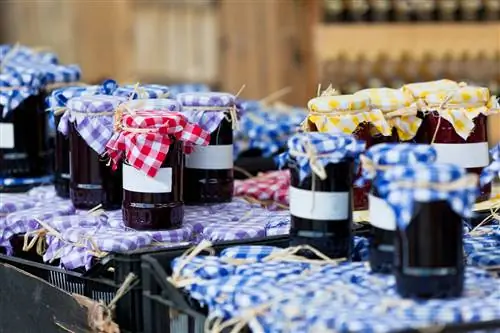- Author admin [email protected].
- Public 2023-12-17 03:39.
- Last modified 2025-01-24 12:45.
Selling homemade food is an interesting way for many people to earn some extra money or start their own business. Before implementation, it is important to know which requirements and laws must be observed in order to avoid subsequent problems.
Private sales without business registration
Essential when selling homemade food is the way you offer it and what kind of products it is. For the majority, you will either need a permit from your municipality or a business registration. If instead it is un altered food that you have grown yourself, you usually do not have to comply with any regulations. This is a direct sale that is primarily suitable for the following locations (original production):
- Field or field
- own property
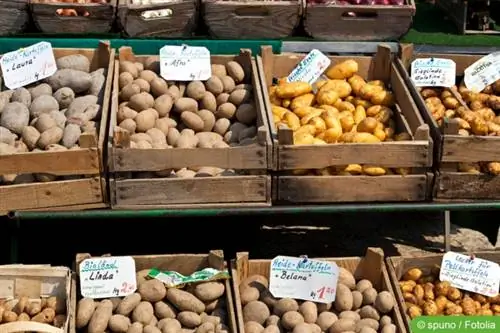
If you want to offer your products unchanged at the weekly or Christmas market instead, you must inform your community. Each municipality places different requirements on the producer or charges a fee. Once you receive your approval, you can start selling. The situation is somewhat different with products that “predominantly come from our own cultivation”. This refers to products whose ingredients are largely produced independently and prepared with other ingredients. This mainly includes jams or juices. You can also offer these without registering as a business, as long as the third-party content, such as sugar, does not amount to more than 50 percent. You can find out the exact values from the responsible he alth authority in your federal state. Before you can offer products for sale that are “predominantly home-grown,” you must consider the following points:
- Conduct food labeling
- Instructions in accordance with Section 43 Paragraph 1 of the Infection Protection Act (IfSG)
- Training according to Regulation (EC) No. 852/2004 on food hygiene
Note:
Depending on the community or municipality, a business registration may be required even for products from “predominantly home-grown production”. Before making an offer, be sure to find out whether this is the case where you live.
Sale with business registration
A business registration is required for the sale of homemade food if it contains more than 50 percent foreign content, is highly perishable or is offered via a sales area that is not on private property. These include, for example, the following:
- Farm shops
- Supermarkets
- own business
- Online shops
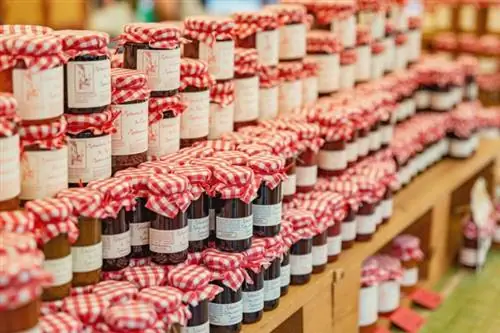
It should also be noted that animal foods not only require a business registration, but also an EU approval for food establishments. Without this you are not allowed to sell the products. Eggs are an exception. If you have fewer than 350 chickens, you are allowed to sell eggs privately according to the Poultry Hygiene Ordinance 2007 as described above. There are no other regulations to follow. Otherwise, you will need a business license, although a small business license is sufficient for many products. In addition to the IfSG instructions, food labeling and food hygiene training, you also have to comply with other requirements for your business:
- Documentation of all work steps and origin of the ingredients according to the EU Basic Regulation (No. 178/2002)
- Requirements for the cold chain
- Requirements of veterinary medicine for the company
- Food safety according to the Food and Feed Code (LFGB)
- Protection against deception through the Food and Feed Code (LFGB)
Hygiene regulations
If you want to sell homemade food that is not original products, you must adhere to strict hygiene regulations. They protect the consumer from illnesses that can arise from incorrect food handling or poor hygiene. In this case, it is not enough that the ingredients are clean. The instruction and training mentioned above informs you and everyone involved, such as possible employees, about the following topics so that the products and their handling are harmless to he alth:
- possible pathogens in food
- Epidemic prevention
- Reporting obligation in the event of contamination
- proper cleaning and disinfection of the premises
- Food hygiene documentation process
- Use of the black and white principle
Food labeling
An often overlooked point when selling food independently is the labeling of the products. As a manufacturer, you must provide a variety of information in accordance with the Food Information Regulation (Regulation (EU) No. 1169/2011). These are important for the consumer so that they are sufficiently informed about your products. This means that you have to take care of a label and also present the essential information online if you package your products or offer them via an online shop.
The essential information is:
- Description or “brand name” of the food
- Ingredients including labeling of allergens
- Net weight
- drained weight
- Fill quantity
- Net filling quantity
- Best before date (optional: recommended use by date)
- Nutritional labeling
- Address of the manufacturer
- Country of origin
- Quality class (highly product dependent)
It is also important to indicate possible hazardous substances such as colors or preservatives that you have added to the product. The ingredients are divided into a list of ingredients and their quantity in percent. For a jam, for example, you often have to specify how much sugar was used. It is also important to ensure that each federal state can impose additional labeling requirements, as the LMIV primarily applies to all EU countries. For this reason, be sure to contact your local nutrition office to find out what information is still necessary. Furthermore, the names of the foods must not be misleading, which can often be the case with vegetarian or vegan food. For example, the following terms are an alternative:
- Milk: hazelnut drink
- Cream cheese: oat spread
- Sausage: meat substitute made from pea protein
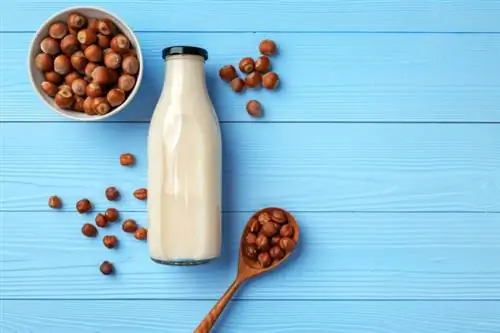
Note:
The Food Information Ordinance is only necessary for products that are made from multiple ingredients or are offered packaged. For example, if you sell fresh vegetables directly from a stand, labeling is unnecessary.
Youth protection
Depending on the food offered, the necessary youth protection regulations must be observed. This primarily involves the sale of alcoholic beverages such as home-brewed beer or fruit liqueurs. The most important information about this can be found in JuSchG § 9 (Alcoholic Beverages). To sell alcohol, you not only need a business, but you also have to make sure that your buyers have reached a certain age. This depends on the alcohol offered:
- from 16 years: fermenting alcohols such as beer, wine, sparkling wine or cider
- from 18 years: spirits such as brandy, tequila or vodka
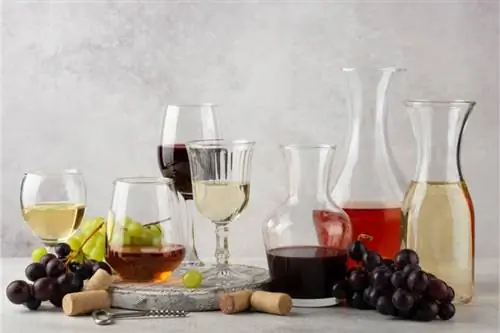
Most brandies have an alcohol content of at least 15 percent. In order to be able to sell alcohol, you must also ensure that all products are labeled as soon as they exceed a volume of 1.2 percent. It is also important to ensure that an age check is carried out when selling and that you as the seller do not sell the products to buyers who are too young. This is possible, for example, using the following methods:
- ID or passport check
- Proof of age via online banking (ID Pass)
- Video review
- POSTIDENT
Note:
Also pay attention to child protection when offering alcohol-filled foods such as chocolates. Due to their filling, they are also among the products that may not be sold to consumers under the age of 18.
Frequently asked questions
What is the Price Information Ordinance (PAngV)?
The PAngV indicates that you offer your products for the final price. This already includes sales tax or VAT and possible additional costs that are included in the price for you as a manufacturer. The PAngV protects consumers from possible price increases after purchase.
Is food production allowed in rental apartments and houses?
That depends on the landlord. It is advisable to ask the landlord before registering the business whether the premises can be used for this purpose. If not, you will need to find additional premises suitable for commercial activities.
Why is an employer permit often required?
If you are employed full-time, in most cases you will need permission from your employer to carry out a part-time job. Selling food counts as a secondary activity. However, for many employers, food sales are not a problem as long as they do not represent competition.
Can alcohol be offered for consumption directly at the place of production?
One business is not enough for that. You also need a bar license (concession) in accordance with Section 3 of the Restaurant Bar Act (GastG). You can obtain this from the responsible public order office in your municipality. Without the liquor license, alcohol may not be sold and enjoyed directly.

